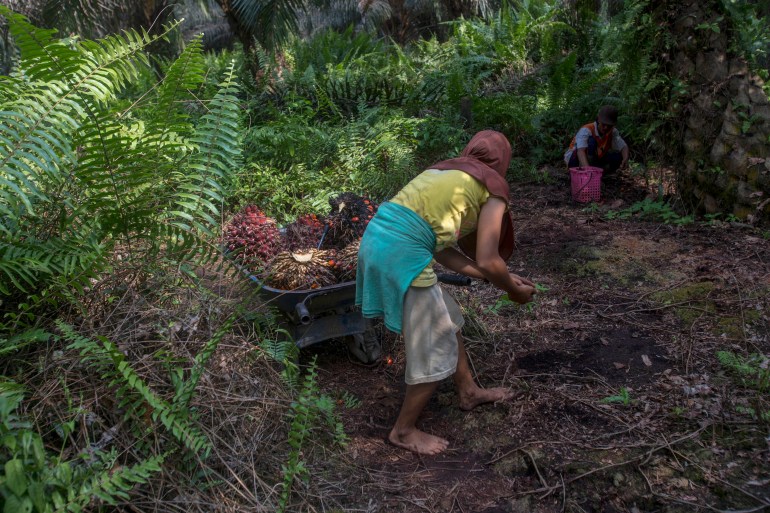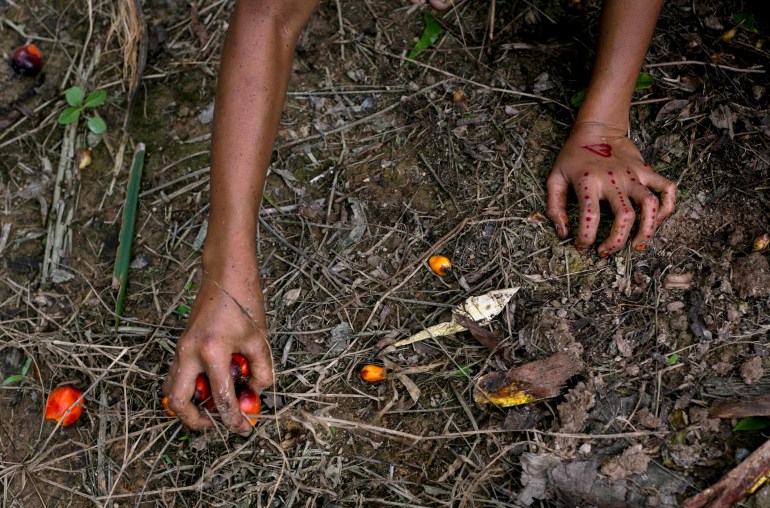Rape, abuses in palm oil fields linked to top cosmetic brands: AP
AP investigation on treatment of women workers in palm oil plantations in Indonesia and Malaysia finds sexual and other forms of abuse.
![A female worker sprays herbicide in a palm oil plantation in Sumatra, Indonesia [Binsar Bakkara/AP]](/wp-content/uploads/2020/11/AP_20319035329104.jpg?resize=770%2C513)
A 16-year-old girl describes how her boss raped her amid the tall trees on an Indonesian palm oil plantation that feeds into some of the world’s best-known cosmetic brands. He then put an axe to her throat and warned her: “Do not tell.”
At another plantation, a woman named Ola complains of fevers, coughing and nose bleeds after years of spraying dangerous pesticides with no protective gear.
Hundreds of miles away, Ita, a young wife, mourns the two babies she lost in her third trimester. She regularly lugged loads several times her weight throughout both pregnancies, fearing she would be fired if she did not.
These are the invisible women of the palm oil industry, among the millions of daughters, mothers and grandmothers who toil on vast plantations across Indonesia and neighbouring Malaysia, which together produce 85 percent of the world’s most versatile vegetable oil.
Palm oil is found in everything from potato chips and pills to pet food, and also ends up in the supply chains of some of the biggest names in the $530bn beauty business, including L’Oréal, Unilever, Procter & Gamble, Avon and Johnson & Johnson, helping women around the world feel pampered and beautiful.
The Associated Press conducted the investigation focusing on the brutal treatment of women in the production of palm oil, including the hidden scourge of sexual abuse, ranging from verbal harassment and threats to rape.
The investigation was part of a larger examination that exposed widespread abuses in the two countries, including human trafficking, child labour and outright slavery.
 A woman helps load palm oil fruit into a wheelbarrow, navigating barefoot through the rough jungle floor in Sumatra, Indonesia [Binsar Bakkara/AP]
A woman helps load palm oil fruit into a wheelbarrow, navigating barefoot through the rough jungle floor in Sumatra, Indonesia [Binsar Bakkara/AP]Many are hired by subcontractors on a day-to-day basis without benefits, performing the same jobs for the same companies for years – even decades.
“Almost every plantation has problems related to labour,” said Hotler Parsaoran of the Indonesian non-profit group, Sawit Watch. “But the conditions of female workers are far worse than men.”
The AP news agency interviewed more than three dozen women and girls from at least 12 companies across both countries. Because previous reports have resulted in retaliation against workers, they are being identified only by partial names or nicknames.
The Malaysian government said it had received no reports about rapes on plantations, but Indonesia acknowledged physical and sexual abuse appears to be a growing problem, with most victims afraid to speak out.
Still, the AP news agency said it was able to corroborate a number of the women’s stories by reviewing police reports, legal documents, complaints filed with union representatives and local media accounts.
Reporters also interviewed nearly 200 other workers, activists, government officials and lawyers, including some who helped trapped girls and women escape, who confirmed that abuses regularly occur.
In both countries, the AP investigation found generations of women from the same families who have served as part of the industry’s backbone. Some started working as children alongside their parents, gathering loose kernels and clearing brush from the trees, never learning to read or write.
And others, like a woman who gave her name as Indra, dropped out of school as teenagers. She took a job at Malaysia’s Sime Darby Plantations, one of the world’s biggest palm oil companies.
Years later, she says her boss started harassing her, saying things like, “Come sleep with me. I will give you a baby.”
Now 26, Indra dreams of leaving, but it is hard to build another life with no education and no other skills. Women in her family have worked on the same Malaysian plantation since her great-grandmother left India as a child in the early 1900s.
“I feel it’s already normal,” Indra said. “From birth until now, I am still on a plantation.”
 A child collects palm kernels from the ground at a palm oil plantation in Sumatra, Indonesia [Binsar Bakkara/AP]
A child collects palm kernels from the ground at a palm oil plantation in Sumatra, Indonesia [Binsar Bakkara/AP]As the decades passed, palm oil became an essential ingredient for the food industry as a substitute for unhealthy trans fats. And cosmetic companies were captivated by its miracle properties: It foams in toothpaste, moisturises soaps and lathers in shampoo.
New workers are constantly needed to meet the relentless demand, which has quadrupled in the last 20 years. On almost every plantation, men are the supervisors, opening the door for sexual harassment and abuse.
The 16-year-old girl who described being raped by her boss in 2017 said it happened when he took her to a remote part of the estate.
“He threatened to kill me,” she said softly. “He threatened to kill my whole family.”
Nine months later, she sat by a wrinkled two-week-old boy. She made no effort to comfort him when he cried, struggling to even look at his face.
The family filed a report with the police, but the complaint was dropped, citing lack of evidence.
The AP news agency heard about similar cases on plantations big and small in both the countries.
Union representatives, health workers, government officials and lawyers said some of the worst examples they encountered involved gang rapes and children as young as 12 being taken into the fields and sexually assaulted by plantation foremen.
While Indonesia has laws in place to protect women from abuse and discrimination, Rafail Walangitan of the Ministry of Women Empowerment and Child Protection said he was aware of many problems identified by the AP news agency on palm oil plantations, including child labour and sexual harassment.
Malaysia’s Ministry of Women, Family and Community Development said it had not received complaints about the treatment of women labourers and offered no comment.
Many beauty and personal goods companies have largely remained silent when it comes to the plight of female workers, but it is not due to lack of knowledge.
The powerful global industry group, Consumer Goods Forum, published a 2018 report alerting 400 CEOs that women on plantations were exposed to dangerous chemicals and “subject to the worst conditions among all palm oil workers”.
Most cosmetic companies contacted by the AP defended their use of palm oil and its derivatives, with some attempting to show how little they use of the roughly 80 million tonnes produced annually worldwide.
Others pointed to pledges on their websites about commitments to sustainability and human rights or to efforts to list their processing mills in the name of transparency.
The AP used United States Customs records, product ingredient lists and the most recent published data from producers, traders and buyers to link the labourers’ palm oil and its derivatives from the mills that process it to the supply chains of almost all big Western brands – including some that source from plantations where women said they were raped.
Abuses were even linked to product lines sought out by conscientious consumers like Tom’s of Maine and Kiehl’s, through the supply chains of their giant parent companies, Colgate-Palmolive and L’Oréal.
Coty Inc, which owns CoverGirl, did not respond to multiple AP calls and emails.
Estee Lauder Companies Inc, the owner of Clinique, Lancome and Aveda, refused to disclose which products use palm oil or its derivatives but acknowledged struggling with traceability issues in filings with a global certification association that promotes sustainable palm oil.
Both companies, along with Clorox, which owns Burt’s Bees Inc, keep the name of their mills and suppliers secret. Clorox said it would raise the allegations of abuses with its suppliers, calling AP’s findings “incredibly disturbing”.
Some of the women on plantations regularly haul tanks of toxic chemicals on their backs weighing more than 13kg (30 pounds), dispensing 302 litres (80 gallons) each day.
Workers who haul agrochemicals daily had milky or red eyes and complained of dizzy spells, trouble in breathing and blurry vision. Activists reported that some totally lost their sight.
Ita, who has worked on the plantation alongside her mother since the age of 15, was among those who said her work affected her ability to deliver healthy children. She lost two babies, both in the third trimester.
“The second time, I gave birth at seven months and it was in critical condition, and they put it in an incubator. It died after 30 hours,” Ita said.
“I kept working,” she said. “I never stopped after the baby died.”


